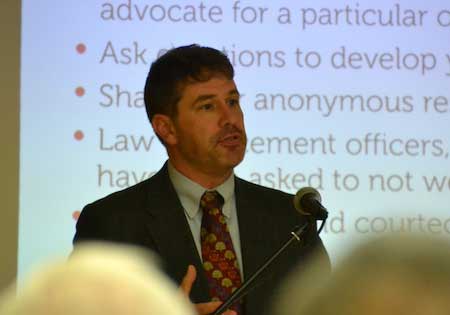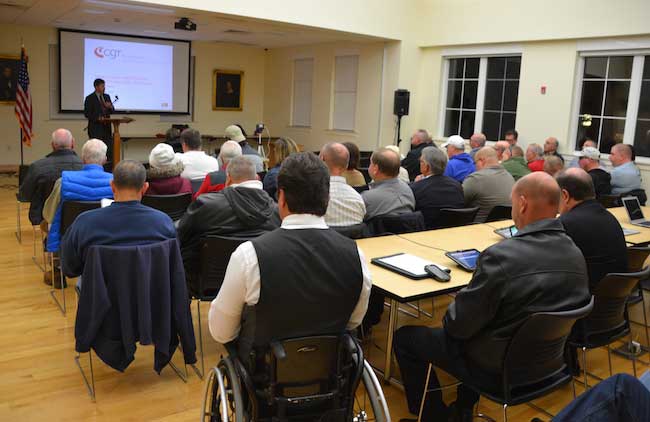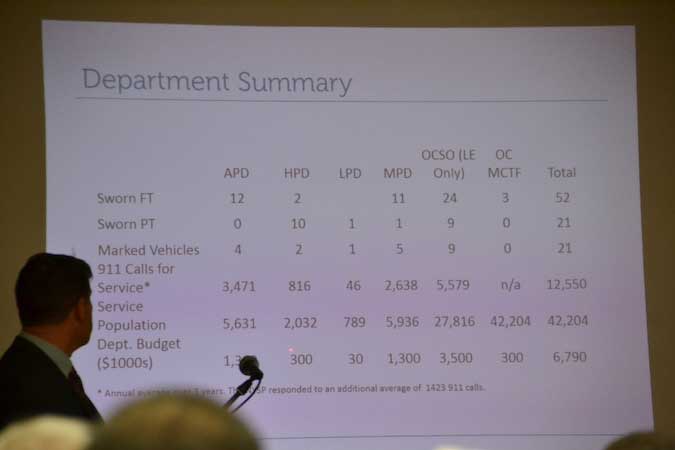Study: Single law enforcement entity for county would be big tax savings for village residents
Outside-village residents would see about $2 increase in tax rate

Photos by Tom Rivers: Paul Bishop, associate principal with the Center for Governmental Research, goes over a list of options for law enforcement services in Orleans County during a meeting Wednesday at Hoag Library in Albion.
ALBION – A committee looking at law enforcement options in Orleans County said one way to increase efficiencies would be to dissolve the village police departments and have the Sheriff’s Office assume the service in the villages.
That would result in a significant tax reduction in the village, $6 to $8 per $1,000 of assessed property in Albion and Medina, while raising the county taxes about $2 per $1,000.
There were two public meetings on Wednesday about the study. A steering committee that includes local law enforcement leaders and elected officials has been working with CGR in Rochester to examine the costs of local law enforcement and see if there are ways to improve efficiencies and reduce costs.
Orleans County municipalities spend about $6.5 million annually for law enforcement with road patrols and other services. About half of that is spent at the Sheriff’s Office. The Village of Albion spends $1.36 million, Medina pays $1.3 million, Holley spends about $300,000 and Lyndonville pays about $30,000 for a part-time officer.
There are 52 full-time officers or deputies in the county, 21 part-time. That doesn’t include State Police.
Paul Bishop, an associate principal with CGR, has been working on the study with a steering committee since August 2016. He presented five options for law enforcement in the county during the two public meetings on Wednesday.

About 60 people, including many law enforcement professionals and elected officials, attended the meeting in Albion. There was also a meeting later about the report in Holley.
Abolishing village police departments would require a referendum at each village. Bishop said the police unions will likely fight the changes and elected officials may not embrace them, either.
“It becomes a community issue to decide what you do moving forward,” he told about 60 people at a public meeting at the Hoag Library. After the 5:30 p.m. meeting in Albion, Bishop and the committee then had a 7:30 p.m. meeting in Holley to go over some of the options in the report. (There is a 5:30 p.m. meeting Nov. 15 at Medina High School Auditorium and a 7 p.m. meeting on Nov. 21 at Lyndonville High School Auditorium.)
Here are the five options presented by the committee:
• Status Quo – No changes with village police departments continuing to be the primary patrol in their villages. The costs will continue to rise, collectively increasing by about $1 million every 5 years, Bishop said.
“The burden on taxpayers, particularly in the villages, will increase,” Bishop said.
• Expanded Collaboration – The remaining departments remain intact but share resources for evidence storage, central booking and holding, and training and tools.

Pete Sidari, an Albion village trustee, raises his hand to ask a question. Sidari said some “hidden costs” may mean the projected savings won’t be as high.
• Villages Scale Back – Albion and Medina both have two officers on night shifts, and Holley has one officer committed overnights. However, there are few calls between 2 and 8 a.m. on weekdays. One option would be for Albion and Medina to have only one officer working during that low-call volume five days a week. Holley could not have an officer at those hours. There are existing resources to help the villages with the Sheriff’s Office and State Police during the overnight.
That would save Albion and Medina about $100,000 a year. The savings wouldn’t be very dramatic in Holley because that department covers many of its shifts with part-time officers.
Kevin Sheehan, a former Albion village trustee, said having only one officer on duty puts the officer at risk. He said he favors paying for two officers at all times, even during the overnight, to improve safety for the responding officers.
• Villages Contract with County – The villages could abolish their departments and contract with the Sheriff’s Office for dedicated patrols and service within the villages. Bishop said residents would notice little change, but would see about $250,000 in savings in the Village of Albion, for example, and about $200,000 in Medina.
The staffing levels could all remain the same. Because deputies at the Sheriff’s Office are paid less than the Albion and Medina police officers, that’s where the villages would see a financial savings, Bishop said.
With the contract option, some higher paid supervisors at the village departments could be reassigned as investigators or in other positions that pay less.
Holley and Lyndonville, because they use part-time staff, would actually have to spend more if they contracted with the Sheriff’s Office because deputies are full-time with benefits.
In the contract option, the villages would pay for patrol cars and capital costs. The villages would still bear much of the expense of the operation, but the law enforcement officers would be county employees managed by the sheriff or an official in the Sheriff’s Office.
“We’d be giving up our ownership and have very little say,” said Pete Sidari, a trustee on the Albion Village Board.
If Albion was able to see a $250,000 savings in the contract option, that would represent about a 10 percent tax cut.

Paul Bishop stands near a slide that shows a breakdown of each law enforcement entity in the county.
• Single Agency – If the Sheriff’s Office did all of the local law enforcement, the headquarters would be in Albion with zone offices in Medina and Holley. Medina and Holley could lease the space to the county or offer the substations for free as an incentive for a law enforcement presence, Bishop said.
Each zone would have a lieutenant, and the the number of law enforcement officers would remain the same as today. Bishop said residents would see little change in service. The current Albion, Medina and Holley police would have expanded patrols to just beyond the village lines where there is a lot of commercial activity. The patrols would ultimately be focused on demand for service, which would still likely be concentrated at the villages.
The steering committee expects there would be improved service and response times with no municipal boundary constraints. There could also be better training and specialization with the county-wide force as the single entity.
There would be a tax shift with this option, with the villages seeing about $3 million in costs moved to the county. That would have a dramatic impact on the Albion tax rate, dropping it from near $18 to about $10. In medina, it would fall from near $18 to about $11, and Holley’s would fall from about $16 to $11. Lyndonville wouldn’t see much change in its rate, which is about $14.
The county tax rate would increase about $2. So the village savings should factor in their high county taxes. In Albion, where the tax rate would drop about $8, the total impact would be about a $6 decrease in the tax rate because of the higher county taxes. For a homeowner with an $80,000 house, that would represent $480 in tax savings.
Bishop said the county might want to ease so of that tax shift so it doesn’t hit the outside-village residents so hard. The county could stop sharing sales tax with the villages or reduce it.
The four villages collectively receive $379,265 in sales tax out of about $16 million in the county.
Any changes that result in abolishing a village police department will be subject to a public referendum, and many more public meetings, Bishop said.
CGR did a survey of the attendees at the meeting to see how many would be interested in a single law enforcement entity for the county. There were 60 people in attendance, and many were elected officials or law enforcement officers. About 60 percent said they were interested in the single entity.
“This is just the start of the conversation,” Bishop said.
To see the report from CGR, click here.




































































